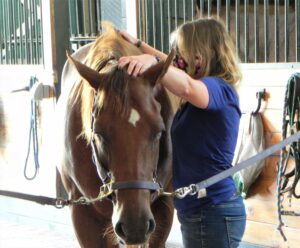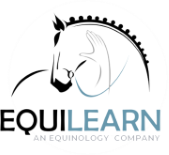
EQ1100: Equine Myofascial Release Techniques Level I
Date:
Location:
Cost:
Duration:
*This course has been approved for 40 hours of continuing education credit in jurisdictions that recognize RACE approval.
Participants in this Level I course are trained in the theory, concepts and practice of Myofascial Release (MFR) as it pertains to the equine body. MFR restores the length and elasticity of the fascia, creating long-term benefits. Following the course, students will immediately be able to produce positive structural changes, whether the problem is an acute or long-standing dysfunction.
Those already certified in equine bodywork will find that this dynamic approach fits in well with their work, adding a new dimension. Wonderful results can be achieved when these MFR techniques are integrated into your existing sessions.
Those just beginning their studies in the equine healthcare industry will find this an easy approach for understanding and applying the modality. This course contains lots of hand-on practice.
This class runs from 8:00am-5:00pm daily with 60 minutes for lunch and 2.5 hours of evening studies.
Theory
- Myofascial/Osseous and Related Structures
- Anatomy
- Biomechanics
- Conformation and Definition of Common Equine Injuries
- Handling and Safety
Myofascial Release Techniques
- Physical Evaluations
- Gait Analysis
- Lower Extremities
- Lumbar/Pelvic Region
- Anterior & Posterior Thoracic Region
- Cervical Spine
- Atlas and Axis
Additional Practicals
- Myofascial Osseous Release
- Myofascial Stretching Techniques
- Therapeutic Exercises
This course is open to anyone with a working knowledge of veterinary vocabulary, anatomy and horse handling skills. Students new to the field are welcome to participate but must first register for the EQ50: Equine Anatomy Precourse Distance Study. Participants of the Equinology® Equine Body Worker Certification course will be well prepared for this course, even if the externship has not yet been completed.
Required Text:
Facilitated Healing Through Myofascial Release: Putting the Pieces Together for Horse and Rider
by Ruth Mitchell-Golladay
Course Materials (included in tuition):
Course Handouts
Externship (included in tuition):
Externship Grading (Case Studies and Visual Presentation)
Suggested Reading:
The Horse in Motion: The Anatomy and Physiology of Equine Locomotion by Pilliner, Elmhurst, & Davies
Any good anatomy book
Ruth Mitchell-Golladay, PT, EEBW, CMT

Ruth, a Texan, received her graduate degree in physical therapy from The University of Iowa in 1972 and opened a private practice in Dallas in 1978. She then attended The Institute of Natural Healing Sciences in Colleyville, Texas, in 1991 for her massage therapy training.
She is Nationally Board Certified in Therapeutic Massage and Body Work and state licensed. Additionally, she obtained her Equinology Equine Body Worker certification in 2004. In 2022, Ruth became a Certified Animal Aromatherapy Specialist.
Ruth began her Myofascial Release education in 1987, has taken all John Barnes MFR courses (including equine), and was a Senior Instructor/Coordinator, Co-lecturer and Primary Lecturer for John Barnes, teaching over 130 courses for him from 1988-2002. From 1999 until her resignation in June 2001, she was the Primary Lecturer for the Barnes Equine MFR courses.
In 1990 Ruth opened the Equine Therapeutic Center which was based at Smith Mountain Lake, Virginia from 1998-2018. It is now based in the Dallas, Texas area from April through October and in the Rio Grande Valley of Texas from November through March. In both locations Ruth provides therapy for horse and rider. She uses her biomechanical knowledge to assist in determining a problem with the horse (or human) and then primarily utilizes Myofascial Release to decrease the symptoms and/or dysfunction. In addition, she uses certified pure tested grade essential oils, laser, electrical stimulation, ultrasound, Red Light Acupoint Therapy, and specialized taping techniques. To assist owner, trainer and/or rider in a home program of care she also includes exercises, including stabilization and core exercises for the horse and rider.
Ruth started teaching for Equinology, Inc. in 1999. She has taught Myofascial Release for horses at facilities in California, Virginia, Texas, Canada, England, Australia, New Zealand and South Africa. Additionally she has taught the Equinology, Inc. Equine Body Worker Certification Courses in the United States, England, New Zealand, South Africa and Australia, Canine MFR in Canada and England, and human MFR in England.
Ruth’s book, Facilitated Healing through Myofascial Release – Putting the Pieces Together for Horse and Rider was first released in 2001. The revised second edition is now available through animalmfr@gmail.com. She has also released a second book, Canine Myofascial Release which is available at the same email.
A $350 deposit is required to hold your spot in a course – the remainder of the tuition is due at least 45 days prior to the course start date. The $350 deposit is nonrefundable and nontransferable, and is credited to the total tuition for the course. Confirmation letters, course outlines, required pre-study (if applicable), directions and lodging options will be sent when the $350 deposit has been received.
*This course has been approved for 40 hours of continuing education credit in jurisdictions that recognize RACE approval.
Participants in this Level I course are trained in the theory, concepts and practice of Myofascial Release (MFR) as it pertains to the equine body. MFR restores the length and elasticity of the fascia, creating long-term benefits. Following the course, students will immediately be able to produce positive structural changes, whether the problem is an acute or long-standing dysfunction.
Those already certified in equine bodywork will find that this dynamic approach fits in well with their work, adding a new dimension. Wonderful results can be achieved when these MFR techniques are integrated into your existing sessions.
Those just beginning their studies in the equine healthcare industry will find this an easy approach for understanding and applying the modality. This course contains lots of hand-on practice.
This class runs from 8:00am-5:00pm daily with 60 minutes for lunch and 2.5 hours of evening studies.
Theory
- Myofascial/Osseous and Related Structures
- Anatomy
- Biomechanics
- Conformation and Definition of Common Equine Injuries
- Handling and Safety
Myofascial Release Techniques
- Physical Evaluations
- Gait Analysis
- Lower Extremities
- Lumbar/Pelvic Region
- Anterior & Posterior Thoracic Region
- Cervical Spine
- Atlas and Axis
Additional Practicals
- Myofascial Osseous Release
- Myofascial Stretching Techniques
- Therapeutic Exercises
This course is open to anyone with a working knowledge of veterinary vocabulary, anatomy and horse handling skills. Students new to the field are welcome to participate but must first register for the EQ50: Equine Anatomy Precourse Distance Study. Participants of the Equinology® Equine Body Worker Certification course will be well prepared for this course, even if the externship has not yet been completed.
Required Text:
Facilitated Healing Through Myofascial Release: Putting the Pieces Together for Horse and Rider
by Ruth Mitchell-Golladay
Course Materials (included in tuition):
Course Handouts
Externship (included in tuition):
Externship Grading (Case Studies and Visual Presentation)
Suggested Reading:
The Horse in Motion: The Anatomy and Physiology of Equine Locomotion by Pilliner, Elmhurst, & Davies
Any good anatomy book
Ruth Mitchell-Golladay, PT, EEBW, CMT

Ruth, a Texan, received her graduate degree in physical therapy from The University of Iowa in 1972 and opened a private practice in Dallas in 1978. She then attended The Institute of Natural Healing Sciences in Colleyville, Texas, in 1991 for her massage therapy training.
She is Nationally Board Certified in Therapeutic Massage and Body Work and state licensed. Additionally, she obtained her Equinology Equine Body Worker certification in 2004. In 2022, Ruth became a Certified Animal Aromatherapy Specialist.
Ruth began her Myofascial Release education in 1987, has taken all John Barnes MFR courses (including equine), and was a Senior Instructor/Coordinator, Co-lecturer and Primary Lecturer for John Barnes, teaching over 130 courses for him from 1988-2002. From 1999 until her resignation in June 2001, she was the Primary Lecturer for the Barnes Equine MFR courses.
In 1990 Ruth opened the Equine Therapeutic Center which was based at Smith Mountain Lake, Virginia from 1998-2018. It is now based in the Dallas, Texas area from April through October and in the Rio Grande Valley of Texas from November through March. In both locations Ruth provides therapy for horse and rider. She uses her biomechanical knowledge to assist in determining a problem with the horse (or human) and then primarily utilizes Myofascial Release to decrease the symptoms and/or dysfunction. In addition, she uses certified pure tested grade essential oils, laser, electrical stimulation, ultrasound, Red Light Acupoint Therapy, and specialized taping techniques. To assist owner, trainer and/or rider in a home program of care she also includes exercises, including stabilization and core exercises for the horse and rider.
Ruth started teaching for Equinology, Inc. in 1999. She has taught Myofascial Release for horses at facilities in California, Virginia, Texas, Canada, England, Australia, New Zealand and South Africa. Additionally she has taught the Equinology, Inc. Equine Body Worker Certification Courses in the United States, England, New Zealand, South Africa and Australia, Canine MFR in Canada and England, and human MFR in England.
Ruth’s book, Facilitated Healing through Myofascial Release – Putting the Pieces Together for Horse and Rider was first released in 2001. The revised second edition is now available through animalmfr@gmail.com. She has also released a second book, Canine Myofascial Release which is available at the same email.
A $350 deposit is required to hold your spot in a course – the remainder of the tuition is due at least 45 days prior to the course start date. The $350 deposit is nonrefundable and nontransferable, and is credited to the total tuition for the course. Confirmation letters, course outlines, required pre-study (if applicable), directions and lodging options will be sent when the $350 deposit has been received.
